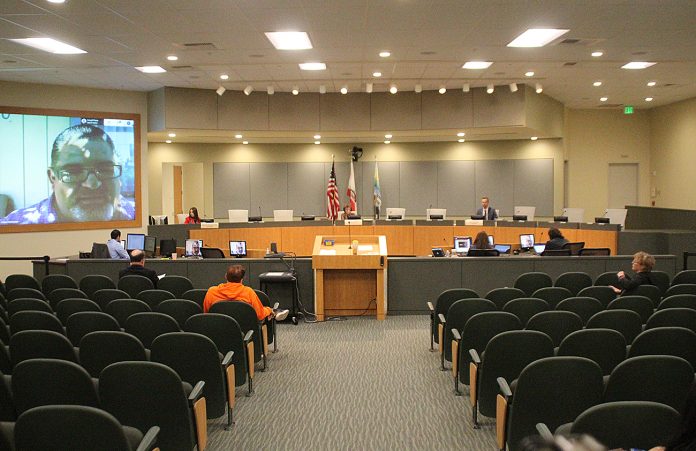
WATSONVILLE—“Hello?”
“Yes, are you there?”
“Can you hear us?”
“Please, unmute your mic.”
Those tech-trouble-induced phrases dominated Watsonville City Council’s Friday morning emergency meeting concerning a proposed eviction moratorium for tenants affected by the COVID-19 outbreak.
The pleas of roughly a half-dozen property managers and landlords that scrambled to get in their say over last-minute phone calls added another layer of bizarre developments to the strange teleconferenced meeting.
The Council ultimately chose to adjourn its discussion on the eviction moratorium until Monday at 2 p.m. but not before it took four pauses to try to fix its technical issues.
It never did.
Councilman Aurelio Gonzalez made a motion to implement the moratorium with four amendments, chief among them was allowing tenants to qualify for the protections without “verifiable” financial documentation—a move thought to protect the city’s most vulnerable residents. He also asked for the moratorium to last at least 60 days, to protect mobile homes and to prevent rent increases during that time.
But that motion failed 4-3, with Council members Ari Parker, Francisco “Paco” Estrada, Trina Coffman-Gomez and Lowell Hurst dissenting because they could not hear much of what was said during the meeting.
Only Mayor Rebecca Garcia, City Manager Matt Huffaker, City Attorney Alan J. Smith and a handful of city staffers attended the meeting in person. All kept arm’s length away from one another to follow the county’s social distancing requirements.
There were also four people scattered throughout the chamber’s vast seating. The public was encouraged to watch and participate from home.
The meeting was conducted via teleconference thanks to an executive order from Gov. Gavin Newsom signed Sunday that temporarily supplants elements of the Brown Act, among other things.
Another executive order from Newsom signed the following day allowed local jurisdictions to halt evictions for renters and homeowners and slow foreclosures.
The meeting was announced Wednesday evening.
Local property owners Bill and Neva Hansen emailed comments prior to the 8 a.m. Friday deadline.
But others phoned in during public comment with confusion, frustration and angst. Many said they did not know the meeting had been scheduled and some asked the Council to push its decision to a later date to allow more public input. A few asked questions during their call, not knowing that they were on a live mic.
“This would be financially crushing to all those landlords who own property,” said Kelly Davis, a local property manager and owner. “It’s not that we’re unwilling to abate some rent but six months would absolutely financially kill us.”
The Council was tasked with making decisions on the duration of the moratorium, the affected property, proof of qualifications and how long renters would have to repay landlords.
Staff recommended the moratorium extend to March 10, be applied to both commercial and residential properties and give delinquent tenants six months after the moratorium lifted to repay the property owner.
The non-codified ordinance would halt evictions that were a direct result from the coronavirus pandemic such as being laid off from work, getting sick or taking care of an afflicted member of the household.
Tenants would need to notify their landlord in writing, document the covered reason and pay what they can despite the emergency.
“This is not an abatement of rent, it’s just a deferral,” Huffaker said.
Since Santa Cruz County officials announced a shelter-in-place order on Monday several local businesses have had to close or reduce their operations. In a Wednesday press conference, Newsom said the state had received 80,000 unemployment claims on Tuesday alone.
That number is expected to skyrocket over the next few days as Newsom on Thursday evening directed all of California’s nearly 40 million residents to stay home unless engaging in “essential activities, essential governmental functions, or to operate essential businesses.”
That downward economic spiral, Smith said, will have drastic impacts in Watsonville’s day-to-day life, as people who can no longer work will not have the means to pay their monthly rent.
“The public policy is to flatten this curve,” Smith said. “If everyone becomes delinquent in rent this month; and everyone is evicted at the same time; and everybody gets sick at the same time; and everybody goes to the hospital at the same time; the curve is not flattened.”
Property managers, however, said the moratorium would wreak havoc on their operations, too, and urged the Council to not make what some said would be a “knee-jerk” reaction.
“We’re in shock. We had no idea about this meeting. We were not notified,” said property manager Clark Codiga. “All I can say [to] everybody making a decision today that a rash decision could have enormous affects on our economy while we’re trying to work through this crisis.”
The moratorium did not address mortgage payments but Huffaker said the City anticipated there would soon be state and federal stimulus packages that will provide relief to homeowners and small-and-medium-sized businesses.
In addition, the federal government on Thursday ordered lenders to reduce or suspend mortgage payments for 12 months, according to NPR, and more relief is expected to come in the future.
“This is going to continue to evolve quickly,” Huffaker said. “We’re staying on top of it, and as opportunities come forward that we think the Council should take action on, we will continue to bring forward to you as well.”
Still, property owners said they have already started talking to their tenants and would rather handle those tough conversations on their own.
“We don’t know what the federal government is going to do, or the state,” Codiga said.









